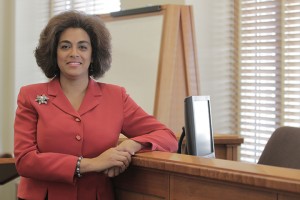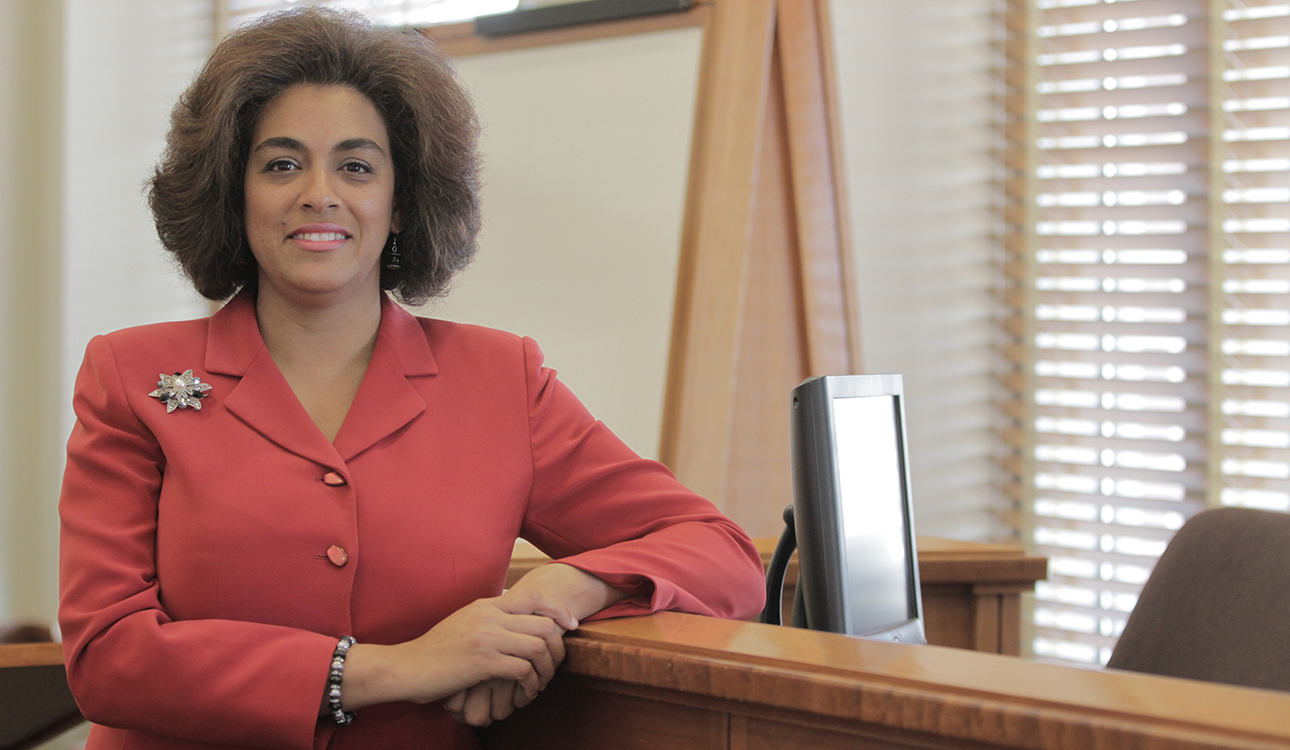
Travis Taylor | Lariat Photo Editor
Staff Writer
Aside from the seven years Deane Strauss-Kinslow spent in prison, she is a typical Baylor student in a lot of ways.
Her schedule is packed with classes, work and the occasional volunteer project with her church. It can be hectic and finding time for herself to sit alone and enjoy the quiet isn’t something she does often. Then again, alone time isn’t something she’s been absent of in life.
Strauss-Kinslow is now a 46-year-old political science junior with dreams of becoming a lawyer. She completed the paralegal program at McLennan Community College in 2012 and is now in her third semester at Baylor, but her path to where she is now was far from traditional.
Her life began inside the walls of what she called a broken home, made more troubling by molestation from her father figure and then, later in her life, disappointment by her husband’s infidelity. What seemed like a never-ending chain of despair for Strauss-Kinslow hit an unparalleled low that she continues to recover from to this day.
Actions and Consequences
In January 2002, a then 35-year-old Strauss-Kinslow was recovering from a painful divorce that left her with one son and the recent unplanned birth of twin boys who were the product of a one-night affair. She also lost a long-standing job with the Dallas attorney general’s office as a private investigator. Everything was happening at once. Then she was charged with endangering one of her twin sons.
“I wasn’t guilty of what they were saying I had done,” Strauss-Kinslow said. “But I wasn’t there for my children like I should have been.”
Realizing she was to blame in some degree for the situation she was in, Strauss-Kinslow pleaded guilty to injury to a child by omission and began her seven-year sentence. She also agreed to sign her rights over to Child Protective Services in what she now calls a dishonest agreement.
She said she was misled to believe she would see her children again but the system failed her.
“I was suicidal for the first three years,” Strauss-Kinslow said. “You feel like you’re losing your soul in there.”
She said she experienced a degree of solitude she had never known because her family did not visit her for the first three years. Her mother had gone into denial about her daughter’s situation, making up stories to church members about where her daughter really was, ashamed to reveal the truth.
However, in all this depression and darkness, she said she eventually found something in prison she never had experienced on the outside – rhythm. She worked every day and learned about the printing trade. She also took classes on leadership and became a more confident woman. In the end, prison was the detour in her life that would set her on a new and brighter path.
Strauss-Kinslow said she used the time in prison to read a book that, while on the outside, had not been utilized like it should have. She read the Bible.
“Prison saved me,” Strauss-Kinslow said. “I’m a better person and that’s the real story here. The greatest testimony I can give is through my new creation in Christ.
Moving Forward
Upon her release from prison, Strauss-Kinslow came to Waco, where she immediately joined the choir at Columbus Avenue Baptist Church and began rebuilding her life. She settled in with a church community she said removed her from the disgrace of her prison life. With a new outlook on life ,she enrolled at MCC. She said she realized for the first time she suffered from attention deficit hyperactivity disorder and could now realign her learning techniques to work around her condition.
The next feat she thought would never be accomplished was transferring to Baylor. After a lengthy application process, which included restrictions on her involvement in student activities, she was one step closer to that elusive dream of becoming a lawyer.
But through all of this she worked with a heavy heart, knowing her three sons lived with adoptive parents and it was possible she would never see them again.
“He will restore all of it,” she said. “That’s what I said and I knew that God was putting things back together. I was still a work in progress.”
Then a part of the restoration she was waiting for began. Her oldest son Adam, now 21, found his mother through a lengthy search for her online.
“He never gave up hope,” she said. “He knew that I had been falsely accused and that I didn’t give up on him. Now a huge hole in my heart and his has been filled.”
Coming Full Circle
Strauss-Kinslow’s plate remained full when she enrolled at Baylor, with her studies and church life. She said she believes in staying involved and contributing to the community. Then, just after one semester at Baylor, she was presented with the opportunity to help people recover from a situation she is all too familiar with.
Dr. Byron Johnson, the co-director at the Baylor Institute for Studies of Religion, learned about Strauss-Kinslow’s unique rise through difficult times and said he thought she would be an ideal person to lead a faith-based nonprofit he helped start, the Cornerstone Assistance Network of Central Texas. The organization helps former inmates assimilate back into life after they have served their time.
“When we heard about Deane’s story we though we should talk to her because she had so much experience and success in her life,” Johnson said. “Now she’s the executive director of Cornerstone.”
Johnson said Strauss-Kinslow has brought a passion to her position that only someone who understands the situation of a former inmate can. She is a contributing member to society who also functions as a role model living out the storybook ending every former inmate hopes to achieve, Johnson said.
“She connects with people the way most people can’t,” Johnson said. “She’s very contagious. When she talks, people listen. She’s one of a kind.”
Strauss-Kinslow’s faith and belief that God can help former convicts is an essential part of the process. Johnson, author of “More God, Less Crime: Why Faith Matters and How It Could Matter More,” said church and faith are large parts of offender rehabilitation.
Johnson said through Strauss-Kinslow’s new position at Cornerstone she is expanding her contribution to society by saving taxpayers the significant costs of incarcerating inmates a second time. She helps people learn to generate revenue for their communities by following in her footsteps, instead of draining a community of its resources, Johnson said.
For Strauss-Kinslow, this is a just a taste of what she said she hopes to do for the rest of her life as an attorney.
Strauss-Kinslow meets with clients on their first day out of prison, which she said is often the hardest because temptation is waiting the moment inmates get off the bus and are greeted with people from their dangerous pasts. She will often drive out to meet clients and bring them back to her brightly painted office at Cornerstone where they can better evaluate their futures.
“These clients come in and they sit across from me and it’s like I’m looking into my former self,” she said. “It’s like I get to help myself over and over again.”
Strauss-Kinslow continues to pray for a reunion with her twin boys, although she said she knows God will handle the situation all in the right time. For now, she is looking forward to revisiting her former prison unit where she has been invited to speak. The invitation is a symbolic one that represents a transition from student to teacher, she said.
Until then, Strauss-Kinslow said she is continuing to search for ways to involve the Baylor community at Cornerstone, where the Baylor spirit could be put to good use. The opportunity for a Baylor student to be part of the development at Cornerstone is an invaluable opportunity for both parties, she said.
Now, instead of a 6-by-8 cell, Straus-Kinslow ends most of her days in an office that reads “Executive Director” and “by appointment only” on wood-framed glass double doors. It has been a transformation she refers to as a circle.
“God has a way of working that way,” she said. “He brought me back around full circle and I just feel so blessed. I know he will open more doors in my future when I need them opened.”






